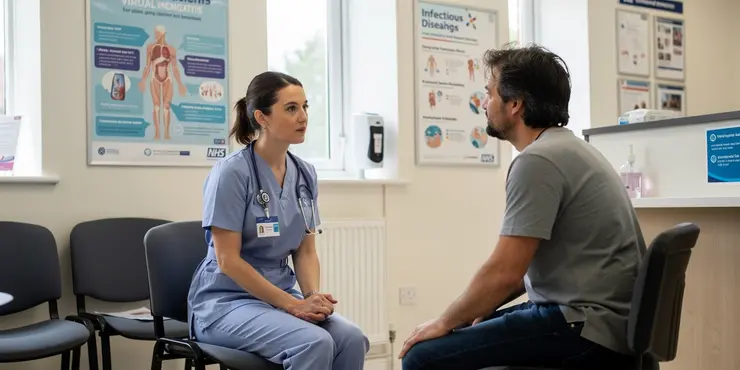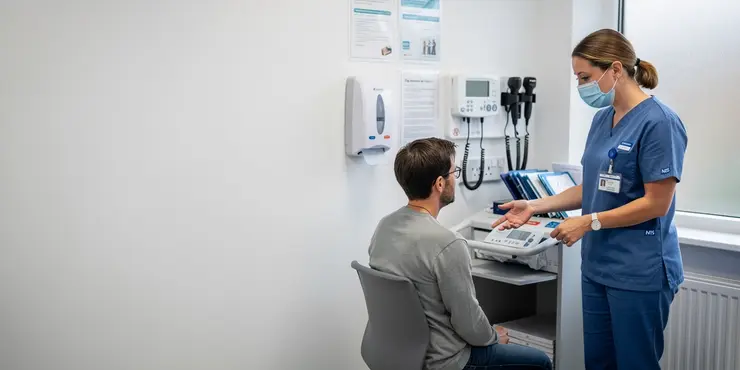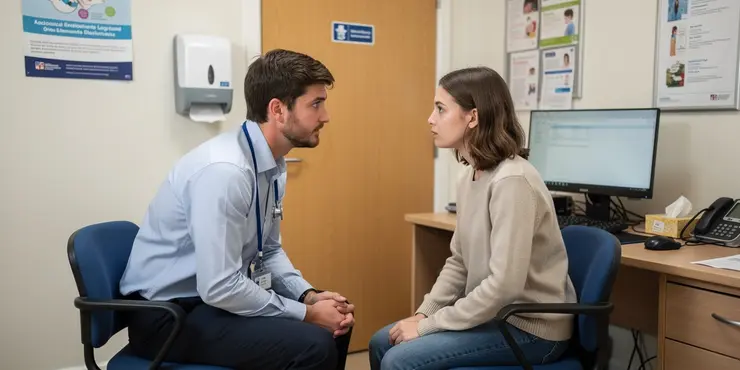
Find Help
More Items From Ergsy search
-

What is non-infectious meningitis?
Relevance: 100%
-

What are the main types of meningitis?
Relevance: 60%
-
Is meningitis contagious?
Relevance: 53%
-

What is meningitis?
Relevance: 51%
-

Are there vaccines for meningitis?
Relevance: 42%
-

Can meningitis be prevented?
Relevance: 40%
-

How is meningitis diagnosed?
Relevance: 40%
-

What are common symptoms of meningitis?
Relevance: 39%
-

Why is meningitis a medical emergency?
Relevance: 39%
-

What causes viral meningitis?
Relevance: 39%
-

How is viral meningitis spread?
Relevance: 39%
-

What is the prognosis for viral meningitis?
Relevance: 39%
-

What are the signs of meningitis in infants?
Relevance: 39%
-

What causes bacterial meningitis?
Relevance: 38%
-

What is the treatment for bacterial meningitis?
Relevance: 38%
-

How serious is bacterial meningitis?
Relevance: 38%
-

Can meningitis cause long-term complications?
Relevance: 38%
-

Who is at higher risk of contracting meningitis?
Relevance: 37%
-

How is fungal meningitis treated?
Relevance: 37%
-

Is vaccination recommended for seniors against meningitis?
Relevance: 37%
-

Who should get a meningitis vaccination?
Relevance: 36%
-

Is meningitis vaccination required for military recruits?
Relevance: 36%
-

Are adults over 25 recommended for meningitis vaccination?
Relevance: 36%
-

Does the CDC recommend meningitis vaccines for adolescents?
Relevance: 36%
-

Should college students get the meningitis vaccine?
Relevance: 36%
-

Should health care workers get the meningitis vaccine?
Relevance: 35%
-

Do international students need the meningitis vaccine?
Relevance: 35%
-

Are there any specific groups that should prioritize meningitis vaccination?
Relevance: 35%
-

What are the guidelines for meningitis vaccination for HIV-infected individuals?
Relevance: 34%
-
What are the meningitis vaccination recommendations for travelers to Hajj or Umrah?
Relevance: 34%
-

Do people who have had meningitis in the past need to be vaccinated?
Relevance: 34%
-

Who is recommended to receive the meningitis vaccination?
Relevance: 16%
-

How long does it take for symptoms to appear?
Relevance: 16%
-

Should travelers consider getting a meningitis vaccine?
Relevance: 15%
-

At what age should children receive the meningococcal vaccine?
Relevance: 14%
-

Can pregnant individuals receive the meningococcal vaccine?
Relevance: 11%
-

Are infants recommended to receive the meningococcal vaccine?
Relevance: 11%
-

Why are teenagers and young adults recommended to get the MenB vaccine?
Relevance: 10%
-

What is a lumbar puncture?
Relevance: 9%
-

Is Crohn's disease contagious?
Relevance: 8%
What is Non-Infectious Meningitis?
Non-infectious meningitis is a type of meningitis that is not caused by infectious agents such as bacteria, viruses, or fungi. Instead, it is often the result of other underlying conditions or external factors that cause inflammation of the meninges, which are the protective membranes covering the brain and spinal cord. Although less common than its infectious counterparts, non-infectious meningitis can still pose significant health risks and requires prompt medical attention.
Causes of Non-Infectious Meningitis
There are several potential causes of non-infectious meningitis, and identifying the exact cause is crucial for effective treatment. Some common causes include:
Autoimmune Disorders: Conditions such as lupus and sarcoidosis can cause inflammation of the meninges due to an abnormal immune response.
Neoplastic Diseases: Cancers, especially those that affect the central nervous system, can lead to meningitis through tumour invasion or through paraneoplastic syndromes.
Medications: Certain drugs, particularly those used in chemotherapy or antibiotics, have been associated with aseptic meningitis as an adverse reaction.
Injury or Surgery: Head injury or surgeries involving the brain and spinal cord can sometimes lead to meningitis due to irritation or inflammation.
Understanding the underlying cause is key to managing and treating non-infectious meningitis effectively.
Symptoms
The symptoms of non-infectious meningitis are similar to those of infectious meningitis, making it challenging to distinguish based solely on clinical presentation. Common symptoms include:
Severe Headache: Often described as the worst headache of a person's life, this is a hallmark symptom of meningitis.
Neck Stiffness: Stiffness and pain when moving the neck are frequent complaints.
Fever: Though usually less pronounced than in bacterial meningitis, a fever can be present.
Photophobia: A sensitivity to light can occur, causing discomfort in bright environments.
Other symptoms may include nausea, vomiting, and altered mental status.
Diagnosis and Treatment
Diagnosing non-infectious meningitis involves ruling out infectious causes through tests such as blood cultures and lumbar punctures. The cerebrospinal fluid (CSF) analysis is vital in diagnosing and understanding the nature of the meningitis.
Treatment for non-infectious meningitis focuses on addressing the underlying cause and alleviating symptoms. Corticosteroids may be used to reduce inflammation, and other medications might be required depending on the specific causative condition. Supportive care, such as pain management and hydration, is also important.
Conclusion
While non-infectious meningitis is less common than its infectious forms, its potential causes and symptoms necessitate careful medical evaluation and management. Understanding its causes and ensuring timely diagnosis and treatment can help mitigate complications and promote recovery.
What is Non-Infectious Meningitis?
Non-infectious meningitis is when the covering of the brain and spine gets swollen, but it's not because of germs like bacteria or viruses. Instead, other things can make it happen. It can still be dangerous and needs a doctor quickly.
Causes of Non-Infectious Meningitis
There are different things that can cause non-infectious meningitis. It's important to know the cause to treat it properly. Some common causes are:
Autoimmune Disorders: This happens when the body attacks itself by mistake, like with lupus.
Neoplastic Diseases: This is when cancer, especially in the brain, causes swelling.
Medications: Some medicines, like those for cancer or infections, can cause issues.
Injury or Surgery: Hurting your head or having brain surgery can sometimes cause swelling.
Finding the cause helps doctors treat non-infectious meningitis better.
Symptoms
Non-infectious meningitis has symptoms like other meningitis types. It's hard to tell the difference without tests. Common symptoms are:
Severe Headache: It can feel like the worst headache ever.
Neck Stiffness: It might hurt to move your neck.
Fever: You might have a high temperature.
Photophobia: Bright lights can hurt your eyes.
Other signs might be feeling sick, throwing up, or being confused.
Diagnosis and Treatment
Doctors do some tests to make sure there's no infection. Tests like blood tests or taking a bit of fluid from your back can help. The treatment depends on what's causing the problem.
Sometimes, medicines called corticosteroids help with swelling. You might need other medicine for the main cause. It's also important to drink fluids and manage pain.
Conclusion
Non-infectious meningitis is not as common, but knowing what causes it and spotting symptoms early can help doctors treat it. Quick care can stop problems and help you feel better.
Frequently Asked Questions
What is non-infectious meningitis?
Non-infectious meningitis is inflammation of the protective membranes covering the brain and spinal cord, not caused by an infection.
What are the common causes of non-infectious meningitis?
It can be caused by autoimmune diseases, cancer, certain medications, and inflammatory diseases.
How does non-infectious meningitis differ from infectious meningitis?
Non-infectious meningitis is not caused by bacterial, viral, or fungal infections, while infectious meningitis is.
What are the symptoms of non-infectious meningitis?
Symptoms can include headache, neck stiffness, fever, sensitivity to light, and altered mental state.
Can non-infectious meningitis be life-threatening?
Yes, it can be severe and requires prompt medical attention to prevent complications.
How is non-infectious meningitis diagnosed?
Diagnosis is often made through lumbar puncture, imaging studies, and reviewing patient history.
What treatment options are available for non-infectious meningitis?
Treatment may involve corticosteroids to reduce inflammation and treating the underlying cause.
Can medications cause non-infectious meningitis?
Yes, certain medications such as NSAIDs, antibiotics, and intravenous immunoglobulins can trigger it.
Is non-infectious meningitis contagious?
No, non-infectious meningitis cannot be spread from person to person.
What are the long-term effects of non-infectious meningitis?
Possible long-term effects include chronic headaches, seizures, and cognitive difficulties.
How is non-infectious meningitis prevented?
Prevention involves managing risk factors such as autoimmune diseases and using medications responsibly.
What role do autoimmune diseases play in non-infectious meningitis?
Autoimmune diseases can cause inflammation of the meninges, leading to non-infectious meningitis.
Can cancer lead to non-infectious meningitis?
Yes, certain cancers like leukemia and lymphomas can cause meningeal irritation.
What is the prognosis for non-infectious meningitis?
The prognosis varies depending on the cause and promptness of treatment; some people recover completely, while others may have ongoing issues.
Who is at risk for non-infectious meningitis?
Individuals with autoimmune diseases, cancer, and those taking certain medications are at higher risk.
What tests are conducted to rule out infectious causes in meningitis?
CSF analysis, blood cultures, and imaging studies help to distinguish between infectious and non-infectious causes.
How quickly do symptoms of non-infectious meningitis develop?
Symptoms can develop rapidly over a few hours to days.
What is aseptic meningitis, and is it the same as non-infectious meningitis?
Aseptic meningitis is a term used for meningitis not caused by specific bacterial infections, which includes non-infectious causes.
Can previous episodes of infectious meningitis lead to non-infectious meningitis?
It's uncommon, but previous meningitis can potentially lead to issues with the brain's protective membranes later.
Is hospitalization required for non-infectious meningitis?
Hospitalization may be required depending on the severity of symptoms and underlying cause.
What is non-infectious meningitis?
Meningitis is when the brain and spine get swollen. Non-infectious means you can't catch it from someone else. It can happen because of other health problems or medicines.
Here are some tips to help understand:
- Ask a doctor or nurse to explain.
- Use pictures to make it clearer.
- Talk with someone you trust about it.
Non-infectious meningitis means that the lining around the brain and spinal cord is swollen. This swelling is not because of germs or infections.
What can cause non-infectious meningitis?
Non-infectious meningitis is when the brain and spine get swollen, but it's not from germs or bacteria. Here are some common causes:
- Medicines: Some medicines can make the brain swell.
- Injury: Getting hurt in the head or back can lead to swelling.
- Certain diseases: Some illnesses, like lupus or cancer, can cause swelling.
If you want help to understand better, you can:
- Ask a teacher or parent to explain.
- Use pictures to help you learn.
- Listen to recordings about the topic.
Some things can make this happen. It can be because of:
- Body fighting itself (called autoimmune diseases)
- Cancer
- Some medicines
- Diseases that cause swelling (called inflammatory diseases)
If reading is hard, you can:
- Use a ruler or finger to follow the lines.
- Ask someone to read with you.
- Take breaks if you get tired.
What is the difference between non-infectious meningitis and infectious meningitis?
Non-infectious meningitis is caused by other things, not germs. It can be from an injury, certain medicines, or some illnesses.
Infectious meningitis is caused by germs. These can be viruses, bacteria, or fungi.
Tools and Tips: Use pictures or videos to better understand these terms. Talk with someone if you have questions. They can help explain it to you.
There are two types of meningitis. One type is non-infectious meningitis. This is not caused by germs like bacteria, viruses, or fungi. The other type is infectious meningitis. This is caused by germs.
What are the signs of non-infectious meningitis?
Meningitis can make you feel very sick.
Here are some signs to look for:
- A bad headache
- A stiff neck
- Feeling sick or throwing up
- Feeling very tired
- Having trouble thinking clearly
If you think you have these signs, it is important to tell a grown-up or see a doctor.
It can help to write things down to remember them.
If you have trouble reading, try using a reading app or ask someone to help you.
Signs that something is wrong can be a sore head, a stiff neck, a fever, not liking bright lights, and feeling confused.
Can non-infectious meningitis be dangerous for life?
Yes, it can be very bad. You need to see a doctor quickly to stop it from getting worse.
How do doctors find out if someone has non-infectious meningitis?
To find out what is wrong, doctors can do a few things:
- Take some fluid from your back. This is called a lumbar puncture.
- Look at pictures of the inside of your body. This is called imaging.
- Talk to you and read your health story, called your patient history.
These help doctors understand what might be making you feel unwell.
What treatments are there for non-infectious meningitis?
If you have non-infectious meningitis, doctors can help. Here are some things they might do:
- Give you medicine to help with pain or fever.
- Make sure you drink lots of water.
- Let you rest in a quiet, dark room.
Doctors will check to see what is best for you. Family and friends can help by being supportive and staying informed.
If you have trouble reading, you can use audiobooks. They are books you can listen to. You can also ask someone to read with you.
The doctor might give you medicine called corticosteroids. This medicine helps to make swelling go down. The doctor will also try to fix what is making you sick in the first place.
Can medicine make you sick with meningitis that is not from germs?
Yes, some medicines can cause it. These include painkillers, antibiotics, and treatments that help your immune system.
Can you catch non-infectious meningitis from someone else?
No, you cannot catch non-infectious meningitis from other people.
Tip: If you find long words tricky, try breaking them down. For example, "meningitis" can be split into "men-in-gitis."
No, you cannot catch non-infectious meningitis from another person.
What happens later if someone has non-infectious meningitis?
Non-infectious meningitis means the swelling of the protective layers around the brain that is not caused by germs. It is important to know what can happen to someone later if they have this.
Non-infectious meningitis can cause problems that last a long time. These may include:
- Headaches that don't go away.
- Having trouble remembering things.
- Finding it hard to concentrate.
- Hearing problems that might not get better.
- Feeling very tired.
If your child had non-infectious meningitis, talk to the doctor about what help they might need. Sometimes, there are special classes or helpers at school.
Here are some things you can do to support someone:
- Using reminders like sticky notes or alarms to help remember things.
- Taking lots of breaks and having quiet time.
- Going to a counselor or therapist can also help.
Doctors and teachers can give more advice to help with these problems.
Some problems can last a long time. You might get bad headaches a lot. Some people can have seizures, where they shake and can't control their body. It can also be hard to think or remember things.
If you need help, you can:
- Talk to a doctor
- Use apps to remind you of things
- Try breathing exercises to stay calm
How can we stop non-infectious meningitis?
Non-infectious meningitis is not spread by germs. It cannot be caught from someone else.
To stop non-infectious meningitis, follow these tips:
- Get regular check-ups with your doctor.
- Drink lots of water.
- Eat healthy foods like fruits and vegetables.
- Rest and sleep enough each night.
- Ask a doctor if you have any questions or feel sick.
If you find reading hard, you can:
- Ask someone to read with you.
- Use audiobooks to listen to the information.
- Break down reading into small parts.
Remember, it's important to take care of your body.
Prevention means stopping something bad from happening. To stay healthy, make sure to help your body fight off diseases. Also, take medicine the right way and only when you need it.
How do autoimmune diseases cause meningitis that is not from germs?
Autoimmune diseases can make the body attack itself by mistake.
Sometimes, this attack can cause the brain's covering to swell. This is called meningitis.
If the swelling is not from germs like bacteria or viruses, it is non-infectious meningitis.
Helpful Tips:
- Use colorful drawings or diagrams to show how the body works.
- Listen to audiobooks or watch videos to learn more.
- Ask a teacher or helper if you have questions.
Sometimes, the body's defense system can make mistakes and cause problems. This can make the thin coverings around the brain swell up. This is called swelling, or inflammation. This can happen even if there are no germs causing an infection.
If you have trouble reading, try using a ruler or your finger to help guide you along the lines. Or, ask a family member, friend, or teacher to read with you.
Can cancer cause non-infectious meningitis?
Cancer is a disease where cells in the body grow too much.
Meningitis is when the covering of the brain and spine gets swollen.
Non-infectious meningitis is not caused by germs like bacteria or viruses.
Sometimes, cancer can make the brain and spine covering swollen.
It's important to talk to a doctor to learn more.
Using picture books or videos can help understand better.
Yes, some cancers like leukemia and lymphomas can make the coverings of the brain and spine irritated.
What happens if you have non-infectious meningitis?
Non-infectious meningitis is when the brain and spine get swollen, but it is not from germs. It can be caused by things like injury, medicine, or health problems.
People usually get better with help from doctors. They might need to rest, drink lots of water, and take medicine.
Ask a doctor if you have questions. They can help you understand. Drawing pictures or using tools like talk-to-text can help too.
The chance of getting better depends on what caused the problem and how quickly treatment started. Some people get all better, while others might have problems that last a long time.
Who can get non-infectious meningitis?
Some people have a higher chance of getting sick. These people include:
- People with diseases where the body attacks itself.
- People with cancer.
- People who take some special medicines.
If you need help reading, you can:
- Ask someone to read with you.
- Use a tool that reads text out loud.
What tests are done to check for infections in meningitis?
Meningitis is when the brain or spine gets swollen. Doctors do tests to find out if germs like bacteria or viruses are causing it. Here are some tests they might use:
- Blood test: Taking a small amount of blood to see if there are signs of infection.
- Spinal tap (lumbar puncture): Taking a little fluid from around the spine to look for germs.
- CT or MRI scan: Taking pictures of the brain to check for swelling.
These tests help doctors know what kind of medicine is needed. If you have questions, ask the doctor or nurse. It's okay to want to know more!
Doctors do some tests to find out why someone is sick. They can look at the fluid around the brain, test the blood, and take pictures inside the body. These tests help doctors know if it's caused by germs or something else.
How fast do signs of non-infectious meningitis show up?
Non-infectious meningitis is when the brain and spine get swollen but it's not because of germs.
Signs can start quickly or slowly. This means you might notice them fast, or it might take some time.
Here are some signs to watch out for:
- Bad headache
- Stiff neck
- Feeling sick or throwing up
- Feeling confused
- Being very sleepy
If you think you have these signs, ask a grown-up for help. It's a good idea to talk to a doctor.
Tools to help:
- Pictures can help understand more.
- Ask someone to explain it to you in simple words.
Signs can show up quickly in just a few hours or days.
What is aseptic meningitis, and is it the same as non-infectious meningitis?
Aseptic meningitis is when the covering around the brain and spine gets swollen. Germs do not cause it. Sometimes, people call it non-infectious meningitis because it does not spread from person to person.
If you need help reading, you can ask someone to read out loud to you or use a reading app. It might also help to look at pictures or videos about meningitis.
Aseptic meningitis is a kind of meningitis. It happens when there is no specific bacteria causing it. Sometimes, it isn't even because of an infection.
Can having infectious meningitis before cause non-infectious meningitis later?
If you had a sickness called infectious meningitis before, you might wonder if it can make you have non-infectious meningitis later. Infectious meningitis comes from germs like bacteria or viruses. Non-infectious meningitis is caused by other things, not germs.
If you are worried, it's good to talk to a doctor. They can help explain if this can happen and tell you how to stay safe.
When reading or thinking about health, you can:
- Ask someone you trust to help you understand the information.
- Use pictures or drawings to help explain ideas.
- Take your time to read and don't rush. It's okay to ask questions!
Meningitis is an illness. It can affect the brain. Sometimes, after having meningitis, there can be problems with the brain's coverings later on. But this does not happen often.
Do you need to go to the hospital if you have non-infectious meningitis?
If you have non-infectious meningitis (a sickness in the brain that does not spread), sometimes you might need to go to the hospital. Doctors can help check and make sure you get better.
- Talk to a Doctor: It's a good idea to ask your doctor. They can tell you what is best for you.
- Use Pictures: Looking at pictures can help you understand what is happening.
- Ask Questions: It's okay to ask a lot of questions to understand better.
You might need to stay at the hospital if your symptoms are very bad or if there's a serious reason causing them.
Useful Links
This website offers general information and is not a substitute for professional advice.
Always seek guidance from qualified professionals.
If you have any medical concerns or need urgent help, contact a healthcare professional or emergency services immediately.
Some of this content was generated with AI assistance. We’ve done our best to keep it accurate, helpful, and human-friendly.
- Ergsy carfully checks the information in the videos we provide here.
- Videos shown by Youtube after a video has completed, have NOT been reviewed by ERGSY.
- To view, click the arrow in centre of video.
- Most of the videos you find here will have subtitles and/or closed captions available.
- You may need to turn these on, and choose your preferred language.
- Go to the video you'd like to watch.
- If closed captions (CC) are available, settings will be visible on the bottom right of the video player.
- To turn on Captions, click settings .
- To turn off Captions, click settings again.
More Items From Ergsy search
-

What is non-infectious meningitis?
Relevance: 100%
-

What are the main types of meningitis?
Relevance: 60%
-
Is meningitis contagious?
Relevance: 53%
-

What is meningitis?
Relevance: 51%
-

Are there vaccines for meningitis?
Relevance: 42%
-

Can meningitis be prevented?
Relevance: 40%
-

How is meningitis diagnosed?
Relevance: 40%
-

What are common symptoms of meningitis?
Relevance: 39%
-

Why is meningitis a medical emergency?
Relevance: 39%
-

What causes viral meningitis?
Relevance: 39%
-

How is viral meningitis spread?
Relevance: 39%
-

What is the prognosis for viral meningitis?
Relevance: 39%
-

What are the signs of meningitis in infants?
Relevance: 39%
-

What causes bacterial meningitis?
Relevance: 38%
-

What is the treatment for bacterial meningitis?
Relevance: 38%
-

How serious is bacterial meningitis?
Relevance: 38%
-

Can meningitis cause long-term complications?
Relevance: 38%
-

Who is at higher risk of contracting meningitis?
Relevance: 37%
-

How is fungal meningitis treated?
Relevance: 37%
-

Is vaccination recommended for seniors against meningitis?
Relevance: 37%
-

Who should get a meningitis vaccination?
Relevance: 36%
-

Is meningitis vaccination required for military recruits?
Relevance: 36%
-

Are adults over 25 recommended for meningitis vaccination?
Relevance: 36%
-

Does the CDC recommend meningitis vaccines for adolescents?
Relevance: 36%
-

Should college students get the meningitis vaccine?
Relevance: 36%
-

Should health care workers get the meningitis vaccine?
Relevance: 35%
-

Do international students need the meningitis vaccine?
Relevance: 35%
-

Are there any specific groups that should prioritize meningitis vaccination?
Relevance: 35%
-

What are the guidelines for meningitis vaccination for HIV-infected individuals?
Relevance: 34%
-
What are the meningitis vaccination recommendations for travelers to Hajj or Umrah?
Relevance: 34%
-

Do people who have had meningitis in the past need to be vaccinated?
Relevance: 34%
-

Who is recommended to receive the meningitis vaccination?
Relevance: 16%
-

How long does it take for symptoms to appear?
Relevance: 16%
-

Should travelers consider getting a meningitis vaccine?
Relevance: 15%
-

At what age should children receive the meningococcal vaccine?
Relevance: 14%
-

Can pregnant individuals receive the meningococcal vaccine?
Relevance: 11%
-

Are infants recommended to receive the meningococcal vaccine?
Relevance: 11%
-

Why are teenagers and young adults recommended to get the MenB vaccine?
Relevance: 10%
-

What is a lumbar puncture?
Relevance: 9%
-

Is Crohn's disease contagious?
Relevance: 8%


